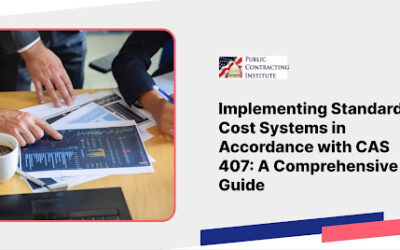Federal Acquisition Regulation (“FAR”) FAR 52.212-4(l) (Contract Terms and Conditions for Commercial Products and Commercial Services) states that:
FAR 52.212: Termination for the Government’s convenience. The Government reserves the right to terminate this contract, or any part hereof, for its sole convenience. In the event of such termination, the Contractor shall immediately stop all work hereunder and shall immediately cause any and all of its suppliers and subcontractors to cease work. Subject to the terms of this contract, the Contractor shall be paid a percentage of the contract price reflecting the percentage of the work performed prior to the notice of termination, plus reasonable charges the Contractor can demonstrate to the satisfaction of the Government using its standard record keeping system, have resulted from the termination. The Contractor shall not be required to comply with the cost accounting standards or contract cost principles for this purpose. This paragraph does not give the Government any right to audit the Contractor’s records. The Contractor shall not be paid for any work performed or costs incurred which reasonably could have been avoided.
When a contractor seeks to recover its reasonable charges, a contractor has the burden of proving the loss “with sufficient certainty so that the determination of the amount of damages will be more than mere speculation.” Lisbon Contractors, Inc. v. United States, 828 F. 3d 759 (Fed.Cir. 1987) quoting Willems Indus. Inc v. United States, 296 F. 2d 822, 831 (Ct. Cl. 1961). The FAR further provides that a claimant must prove its reasonable charges “using its standard record keeping system.” In ACLR, LLC v. United States, No. 15-767C (Fed. Cl. Nov. 2, 2022), the claimant was unable to demonstrate that it used a “standard recordkeeping system.”
In ACLR, the Court could not find precedent describing the requirements for a “standard record keeping system” but it used plain language and interpreted terms in accordance with their common meanings. First it noted that “standard” indicated a measure of commonness or regularity, and the term “system” indicated orderliness and organization. It concluded that “taken together, these definitions indicate that a standard system is a regularly used, carefully thought-out method that involves a set of organizing and orderly procedures.” Unfortunately, the Court found that the plaintiff-claimant could not provide evidence that its system satisfied this definition.
FAR 52.212: The plaintiff-claimant stated that his standard record keeping system:
includes the use of Quickbooks, an accounting software package, to track costs; Microsoft File Explorer, which electronically stores vendor invoices, client work product and archived communications data; Microsoft Outlook, which tracks company communications, external suppliers and various external file storage devices used to back up and secure company data to ensure against data loss; and paper files for employee and contract information.
The plaintiff admitted that it did not specifically track its hours, and acknowledged that it used estimates to support some of its cost claims.
The government moved to dismiss the claim because it failed to prove an essential element of its case—namely that its method of proving reasonable costs comported with the FAR requirement discussed above.
The Court found that there was no regular and organized method for tracking the costs. The Court noted that an acceptable method need not be elaborate, costly and burdensome—but that the plaintiff-claimant’s system merely described a “vast collection” of documents, some of which actually reflected post-hoc estimates. The system did not describe a systematic or organized method of tracking costs relevant to a particular project, and really had no standard system for tracking the data in place. The Court therefore accepted the government’s motion for summary judgment, and dismissed the complaint.
Takeaway: In any claim, the contractor bears the burden of proving its costs. In a termination for convenience of a commercial contract, although similar to other termination for convenience claims, the FAR specifically requires the payment of a percentage of the work performed, plus reasonable charges that the contractor can demonstrate using its standard record keeping system. Although there is no definition of such a system, the court indicated that the system must use a method that involved a set of organizing and orderly procedures. Those were not present here. Instead, the plaintiff-claimant’s “system” was really a “vast collection of documents, rather than a systematic and organization method of tracking project costs.”
Learn more about FAR 52.212 and other parts of the FAR by attending PCI’s high quality government contracts training.
For other helpful suggestions on government contracting, visit:
Richard D. Lieberman’s FAR Consulting & Training at https://www.richarddlieberman.com/, and Mistakes in Government Contracting at https://richarddlieberman.wixsite.com/mistakes.


